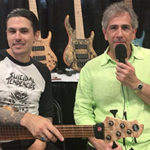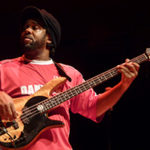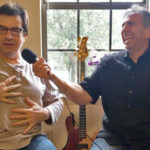Nicaraguan bassist finds his niche in progressive metal
Exclusive interview with FBPO’s Jon Liebman
September 28, 2020
Winston “Wins” Jarquin is the bassist for Sifting, a Venezuelan/American progressive metal band. The group, formed in 2010 by guitarist/vocalist Eduardo Osuna Gil, also includes lead guitarist Richard Garcia and drummer Joey Aguirre. Sifting’s latest album, The Infinite Loop, was released in September 2019.
FBPO: You’ve got an interesting story. Tell me about your musical upbringing and how you became a bass player.
Wins: I was born in California and I was raised in Nicaragua, and pretty much lived there for 16 years. I didn’t play any instruments when I was young, but being over there and Latino, music was part of everything. I grew up singing to just about every song that you think of. My mom sang very well. She’s not a trained singer, but she was a karaoke artist. So I would grow up listening to her and listening to the classics, like Celia Cruz, a lot of Latin, salsa, merengue, cumbia, stuff like that.
FBPO: How did you get started as a musician?
Wins: I played my first instrument, which was guitar, in 2005. I was forced to learn an instrument because I changed schools. To be honest, I hated guitar from the beginning. They were like, “Okay, you’re going to play an instrument,” so I did, and three months in, I got a tutor. When I came back to school, the teacher was like, “How did you learn all of this in just three months?” Because I started practicing every day, I got a feel for it. I started learning Latin music, boleros, bachatas, cumbias, a lot of Afro-Cuban music or Afro-Cuban-influenced music, so the rhythm section was in me from that point on. Eventually, I started doing a few tours playing with local bands in Nicaragua, midsize festivals.
FBPO: You were still playing guitar at this point?
Wins: Yeah. Guitar and singing. I was doing that until I came back to California, where I went to Musicians Institute.
FBPO: Did you move from Nicaragua to California specifically to go to the Musicians Institute?
Wins: No, no. I moved because my family got their green cards and everything, so it was kind of like a logical move for everybody.
FBPO: When you went to the Musicians Institute, were you still a guitar player still or were you already a bass player?
Wins: At that point, I was still a guitar player. I realized that I was a very good composer and arranger and I was skilled in computers, so I decided the logical move was to do film. I wanted to do post-production and I wanted to work in audio engineering. I worked with a few independent contractors, first from USC, a few military rappers here in LA, local stuff, just doing production. At that point, in 2016, Eduardo, who is the lead singer and guitarist for Sifting, reached out to me originally to be a guitar player, however, at the time I was busy with school and I was like, “I can’t man.” Later that summer, he reached out to me again and he’s like, “Dude, we have a tour coming up and I need a bassist right now!” I’m thinking I played bass before. It’s not a big deal. I enjoy it, so I became the bassist for Sifting, and that’s where I turned into a bassist.
FBPO: You mean it wasn’t a big deal for you to play bass because you had already it before, right? You don’t mean that playing the bass is not a big deal. Right? [Laughs]
Wins: [Laughs] Yeah! For me it was more like playing the bass for the band. Yeah, it’s not a big deal. Yeah.
FBPO: Did you start listening to music differently once you became a bass player?
Wins: Actually, yes. When I started playing bass, Eduardo told me, “You were meant to be at bassist from the start!” I didn’t really understand what he meant by that at the beginning, until I started realizing I’ve always liked the very low end of music. There’s the reason why I have the current sound I have. The way that I approach bass is in a hybrid way. I like to preserve a lot of what my previous guitar rhythmic skills are, mixing the production aspects from film and whatnot with bass.
FBPO: Were there any bass influences who got your attention?
Along the way, I listened to a lot of electronic music and produced a lot. I realized at the time, around 2012, that there was a resurgence of dubstep and stuff like that and I realized these guys are doing something cool. The lines that they were doing were very metal, very rhythmic oriented. And I thought, “Why don’t I apply that to the bass?” There were guys like Anthony Jackson from Hiromi, and he was playing a 6-string bass. His sound is very unique and I’m thinking, “Crap, this is actually really cool! You know, he’s mixing his jazz background.” And there’s guys like Evan Brewer, same thing. He’s approaching the bass in a very unique way, a lot more clean, a very, very pristine fluid-like sound. And guys like Amos Williams from TesseracT.
FBPO: Very different kinds of music.
Wins: Yeah, yeah. Then there’s the obvious, like, I grew up with Victor Wooten. And there’s also guys in like the electronic music scene. But when you hear it, it sounds way more massive than any other electronic music out there. And I’m thinking I want to mix the best of all of those worlds. That’s how I get the sound that I have now.
FBPO: You look like you have a lot of fun when you play. I admire your energy!
Wins: Yeah, it drives me! When I’m playing, I’m not just a performer, but I’m there to also entertain. If I was in the audience, I would want to see something unique, you know. I would want to see something that I’ll remember when I leave that night, thinking, “Man, that guy was going crazy!” or, “He’s really enjoying himself and having fun!” And I am. I generally have fun when I’m on stage. I love being there.
FBPO: What was the adjustment like when you joined Sifting? There were several personnel changes happening all at once.
Wins: There were, yes. When I joined the band, Richard, the lead guitar player, joined at the same time. We had Abelardo Bolaño on drums. There was an issue where Abelardo happened to find himself in other realms, in other directions, and were about to go on tour or play a show in Ecuador with Tarja Turunen and Eduardo. Abelardo, at the time, didn’t have his papers, so he said, “You guys have to do what you guys have to do.” Then I met Joey Aguirre, our current drummer, and we became friends. He’s an outstanding drummer. He is also a showman. But more than a showman, he’s very skilled. And that’s been pretty much the lineup since that moment, since 2017.
FBPO: Which albums do you play on?
Wins: I play on the latest album, The Infinite Loop.
FBPO: The Infinite Loop features Derek Sherinian. I just interviewed Derek, even though he’s a keyboard player, because his new album features some pretty heavy bass players like “Fretless Tony” Franklin, Billy Sheehan, and Jimmy Johnson.
Wins: Yeah!
FBPO: What was it like working with him?
Wins: It was very cool. We pretty much worked with him online. We had toured with Sons of Apollo prior and he was very likable. He started talking to us, Billy Sheehan started talking to us, and then they were like, “You guys are pretty cool!” So when we reached out to Derek to be on the album, we sent him the files and it was the fastest thing possible. We sent him the files, like at 3:00 p.m. on a Monday, and then on Tuesday at 3:00 p.m. or 4:00 p.m., he sends us something back and he’s like, “Here you go. I think this one works best for this song.” And we fell in love with it right away. It was exactly what we had in mind!
FBPO: Tell me about your gear.
Wins: I’m endorsed with ESP guitars and basses. I play a B-15 bass and a D-5 five-string, so I have a 5- and a 6-string. Both of them have EMG pickups. I have a hybrid, so I run the active with the passive. I’m not endorsed with EMG, but I like them. And for my bass stuff, it’s all Tech 21. I just run one clean, one dirty, and I pretty much mix them for either front of house or for my amp. I’m not really using an amp at the moment just because everything that I do is all with Tech 21. When we play live, or even for the album, I run my analogue line through my Tech 21. And then the other line I run through an envelope filter, just clean, and that’s it. I just blend the two of them and they send that to the record or the final line.
FBPO: Tech 21 is a phenomenal company. Their equipment is amazing.
Wins: I love them! You could argue, of course, that you have other brands out there, particularly for modern metal players, but there’s something about Tech 21 that just gets it right. There’s no extra whistles and bells. It’s exactly what you need. It’s just perfect. You can get so much from it.
FBPO: What kind of strings do you play?
Wins: I play in DR strings and yeah, they’re great.
FBPO: The ones with the pretty colors?
Wins: The ones with the pretty colors, that’s right. [Laughs]
FBPO: Talk to me a little bit about your technique. Are you primarily a pick player or fingers player? What’s your preference?
Wins: I kind of do it all. Being a guitar player originally, I’m very inspired by guys like Tosin Abasi and all of that stuff from Victor Wooten. I do a mix between thumping, picking, slapping, and fingers, whatever the song calls for. Because it’s a lot metal stuff that we play, I do use a pick pretty often, but I like to add a little bit of contrast, and that contrast comes from a few slapping lines here and there. There’s a song, “A Critical Affair,” where I do a lot of tapping. And a lot of the times, if the song is a little bit more melodic – we have a few power ballads – I do all fingerstyle, just because I really want that round tone. I don’t want that much attack. I want a lot more subtle smoothness.
FBPO: What, advice could you give to somebody who wants to learn to play bass? What do you think is important for them to know?
Wins: I would say the most important thing for a bass player is rhythm. Stay on the beat. And what I mean by that is play to a metronome. If you have a song that you’re familiar with, play to that song with the metronome. If there’s a line you want to play, play to the metronome. If you have a drummer, have the drummer play to the metronome and play with him. Also, a lot of ear training because with bass, once you get that rhythm, the sound aspect of it comes second. Being a bass player, you really need to be locked in with the whole band and to do that, you’d better be properly ear trained to feel where and what to do and what calls for what. You can be the most skilled bass player, but if you’re not locked in, it doesn’t sound good.
FBPO: What do you think about people who say you shouldn’t practice with a metronome? It’s a different school of thought. Jeff Berlin, for one, comes to mind.
Wins: I don’t disagree with them. I think at the end of the day, music is an art form. And as an art form, we know, particularly with the bass, there comes a train of thought, of feel. I get where they come from, “Don’t practice with a metronome. Get a lot of the feel of the instrument.” With my background, being in a metal band, for us it’s all about being locked in. You know, if we’re not locked in, then it doesn’t sound good. I could see why, in some scenarios, like a jam band or something like that, it’s more experimental, a lot of fusion stuff too, if it calls for it to be a little bit like that “drunk” kind of like rhythm, then yeah, by all means, why not? But for my purposes, it’s all about being locked in.
FBPO: What about the future? Obviously, we’re in the middle of this pandemic, but what would you like to do when things get back to normal?
Wins: Well, I’m definitely still going to be with the band. We’re actually still working. We’re working on a single currently that we’re hoping to release. And personally, I am also working on some other stuff where I’m mixing. I always kind of like mixing all the stuff that I like, genres and feels. But I’m for sure still going to be playing. I’m waiting to see how everything comes out. I’m hoping live shows don’t die off [Laughs], ‘cause that’s really what drives me. Until then, we’re just working on music.
FBPO: What would you be if you weren’t a bass player – or a guitar player? What would you be if you weren’t a musician?
Wins: That’s an interesting call. I think I would probably be an architect. I come from a family of architects and I’m pretty good with numbers.
See Jon’s blog, with key takeaways from this interview, here.
The Infinite Loop is available here.








